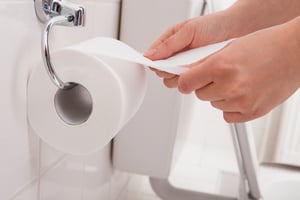In a matter of days, COVID-19 has changed day-to-day life around the world. Across North America panicked consumers are stocking up on essential household items—including toilet paper. But as supplies run low, the public is turning towards alternatives to compensate: paper towels, disinfecting wipes, baby wipes and so-called “flushable” wipes.
These items present a threat of their own, as they can cause major problems in sewer systems.
 The Impact of Flushable Wipes on Wastewater Systems
The Impact of Flushable Wipes on Wastewater Systems
The biggest misconception about flushable wipes is that they are flushable. Toilet paper is lightweight and biodegradable, so it breaks down after flushing. It does not disrupt sewer flow and can easily be processed at wastewater plants. Heavier cloths and papers, on the other hand, maintain their structure and may accumulate, mix with grease and debris, and clog pipes.
The impact of clogs and back ups can be far reaching. They flood homes and businesses with sewage. They cause costly disruptions to wastewater systems and processing facilities, and can lead to spillage into lakes, oceans and rivers, causing irrevocable harm to the environment. “Flushing wipes, paper towels and similar products down toilets will clog sewers and cause backups and overflows at wastewater treatment facilities, creating an additional public health risk in the midst of the coronavirus pandemic,” warns the California State Water Board.
An Outbreak of Back Ups
As we spend more time in our homes, our sewer lines are working overtime. Our growing reliance on wipes is already creating problems. “In my 30 years in the business, [wipes have] always been a problem, but this is the worst I’ve ever seen it,” says one wastewater superintendent in Rhode Island. Service providers from Sarasota to Spokane are warning residents not to flush. The hashtag #wipesclogpipes is trending on Twitter.
In addition to disrupting city-wide utilities and services, wipes can also block laterals and local lines. One plumber in Virginia reports that calls to his company have nearly doubled of late. “We think a lot of that has to do with the TP shortage.” In addition to the inconvenience of clogged pipes, addressing the issue can be costly. And demand for in-home repairs and maintenance disrupts critical crisis response efforts, such as quarantines and social distancing.
Staying Safe and Clean
Only toilet paper and human waste should enter the wastewater system.
The safest way to dispose of heavier papers and wipes is to put them in the trash. Some users may prefer to place used wipes and paper towels in their own separate sanitary bin. When doing so, always follow CDC guidelines for washing hands.
Regularly cleaning sewer lines can prevent long term build up from flushable wipes and debris. Jetscan wireless HD video nozzle can be threaded onto a jetter truck's hose to see inside the lines being cleaning and confirm the effectiveness of the job. Learn more:

